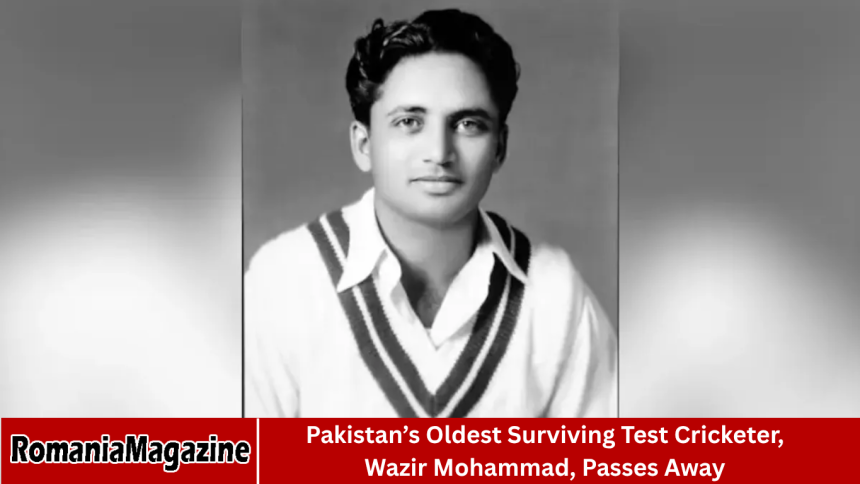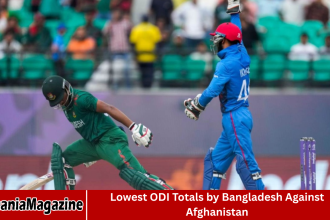Pakistan has lost one of its earliest cricketing icons. Wazir Mohammad, the country’s oldest surviving Test cricketer and one of the pioneering members of Pakistan’s maiden Test team, passed away at the age of 96. His death marks the end of an era.
- Early Life and Background
- The Debut and the Birth of Pakistan Cricket
- A Reliable Middle-Order Batsman
- The Mohammad Legacy in Cricket
- Notable Achievements and Statistics
- Beyond the Field: Wazir’s Role in Cricket Administration and Mentorship
- Tributes from the Cricketing World
- The End of an Era
- Wazir Mohammad’s Personality and Legacy
- Frequently Asked Question
- Who was Wazir Mohammad?
- When and where was Wazir Mohammad born?
- What was Wazir Mohammad’s most famous performance?
- Which of Wazir Mohammad’s family members also played for Pakistan?
- How many Test matches did Wazir Mohammad play?
- What did Wazir Mohammad do after retiring from cricket?
- How is Wazir Mohammad remembered today?
- Conclusion
A technically gifted right-handed batsman, Wazir was part of the illustrious Mohammad family, which produced several cricketing legends, including his brothers Hanif Mohammad, Mushtaq Mohammad, and Sadiq Mohammad.
His passing is not only a moment of mourning for cricket enthusiasts but also an opportunity to look back at the legacy of a man who played a vital role in Pakistan’s journey from a new cricketing nation to a respected force in international cricket.
More Read: Bangladesh Players Emotional After Narrow Loss to South Africa
Early Life and Background
Wazir Mohammad was born on December 22, 1929, in Junagadh, in pre-partition India. Growing up in a cricket-loving household, Wazir was introduced to the game at a young age. His family was deeply passionate about cricket, and this environment nurtured his early interest in the sport.
After the partition of India in 1947, the Mohammad family migrated to Karachi, Pakistan. Despite the political and social upheaval, Wazir’s dedication to cricket did not waver. It was in this newly formed nation that he, along with his brothers, began to carve a new identity for Pakistan cricket.
Cricket at that time in Pakistan was still developing — infrastructure was limited, facilities were scarce, and opportunities were few. Yet, the Mohammad brothers’ determination to excel made them stand out.
Wazir’s early performances in domestic cricket earned him a spot in Pakistan’s first-ever Test squad, marking the beginning of an illustrious international career.
The Debut and the Birth of Pakistan Cricket
When Pakistan gained Test status in 1952, it was more than just a sporting milestone — it was a matter of national pride. Wazir Mohammad was part of the pioneering squad that toured India for Pakistan’s debut Test series.
He made his Test debut on October 16, 1952, against India at the Feroz Shah Kotla Ground in Delhi. It was a historic moment, not just for the team but for every Pakistani who dreamed of seeing their nation compete on the global stage.
Although Pakistan lost that inaugural match, Wazir’s calm demeanor and solid technique at the crease reflected the promise of Pakistan’s cricketing potential. He batted with patience and discipline, qualities that would later define his career.
A Reliable Middle-Order Batsman
Wazir Mohammad was known for his classical batting technique, strong defense, and ability to occupy the crease for long durations. He wasn’t a flashy player; instead, he was steady, composed, and immensely dependable — the kind of batsman who could anchor an innings when wickets were tumbling.
His finest hour came during Pakistan’s 1954 tour of England. Facing one of the strongest bowling attacks in the world, Wazir’s resilience shone through. He scored a crucial 43 in testing conditions at Lord’s and followed it with valuable contributions throughout the series.
His solid batting earned him respect from both teammates and opponents. However, his most memorable performance came during Pakistan’s 1956-57 series against the West Indies in Karachi. In a match that saw Pakistan struggling against a powerful Caribbean side.
Wazir produced a marathon innings of 189 runs — a masterclass in concentration and technique. This innings not only helped Pakistan gain a respectable position but also stood as one of the longest individual efforts in Pakistan’s early Test history.
The Mohammad Legacy in Cricket
Wazir Mohammad belonged to what is often called “Pakistan’s first cricketing family.” His brothers — Hanif Mohammad, Mushtaq Mohammad, and Sadiq Mohammad — all went on to represent Pakistan at the highest level.
Hanif Mohammad, often called the “Little Master,” is remembered for his heroic 337 against the West Indies in 1958, which remains one of cricket’s greatest innings. Mushtaq Mohammad became a world-class all-rounder and later captained Pakistan, while Sadiq Mohammad was a dependable opening batsman.
Wazir, the eldest of the four, was often regarded as the calm and steady influence in the family. He helped guide and mentor his younger brothers in their early cricketing years, instilling in them the values of discipline and hard work.
Together, the Mohammad brothers made invaluable contributions to Pakistan cricket, setting a standard of excellence and professionalism that would inspire future generations.
Notable Achievements and Statistics
During his international career, Wazir Mohammad played 20 Test matches for Pakistan between 1952 and 1959. He scored 801 runs at an average of 27.62, including one century and six half-centuries.
While his numbers may not appear spectacular by modern standards, it’s important to view them in the context of his era — a time when pitches were challenging, and protective gear was minimal. His innings of 189 against the West Indies remains one of the standout performances in Pakistan’s early Test history.
He also represented Karachi and Pakistan Railways in domestic cricket, where he was a consistent performer. His dedication to the game and his ability to play under pressure earned him the respect of teammates, selectors, and fans alike.
Beyond the Field: Wazir’s Role in Cricket Administration and Mentorship
After retiring from professional cricket, Wazir Mohammad continued to serve the sport in various capacities. He remained associated with Pakistan cricket as an administrator, selector, and mentor for young players.
His insights and experience were invaluable in shaping domestic cricket structures in the 1960s and 1970s. Wazir was also known for his humility and passion for developing grassroots cricket. He often attended local matches, encouraging young cricketers to pursue the sport with dedication and integrity.
His involvement in cricket extended beyond Pakistan. Having settled in the United Kingdom later in life, Wazir maintained close ties with the cricketing community, particularly among the South Asian diaspora, who revered him as one of the trailblazers of Pakistan cricket.
Tributes from the Cricketing World
As news of Wazir Mohammad’s passing spread, tributes poured in from across the cricketing world. The Pakistan Cricket Board (PCB) expressed deep sorrow, acknowledging his contributions to the nation’s cricketing journey.
PCB Chairman and former cricketers described Wazir as “a gentleman cricketer” and “a foundational pillar of Pakistan cricket.”
Former captain and commentator Ramiz Raja tweeted: “Wazir Mohammad was among the pioneers who carried the weight of a young nation’s cricketing hopes. His legacy will forever remain part of Pakistan’s cricket history.”
Hanif Mohammad’s son, Shoaib Mohammad, also shared an emotional tribute, calling Wazir “the anchor of the Mohammad family, who taught us all the value of discipline, humility, and respect for the game.”
Fans, journalists, and cricket historians echoed similar sentiments, remembering Wazir as a symbol of Pakistan’s early cricketing resilience.
The End of an Era
With Wazir Mohammad’s passing, Pakistan has lost one of its last living links to the nation’s earliest cricketing chapter. His life and career symbolize the struggles and triumphs of a generation that built Pakistan cricket from the ground up.
He represented an era where passion, patriotism, and perseverance were the driving forces behind every match. Wazir’s contributions may not be measured in statistics alone, but in the lasting foundation he helped establish for future generations.
For young fans of today who know Pakistan as a Test powerhouse with legends like Imran Khan, Wasim Akram, and Babar Azam, it’s important to remember that pioneers like Wazir Mohammad laid the groundwork for all of it.
Wazir Mohammad’s Personality and Legacy
Those who knew Wazir personally describe him as a quiet, dignified man with a deep love for cricket. He believed in playing the game with honor and respect — values that have become increasingly rare in the modern era.
He was also a family man, deeply proud of his brothers’ achievements but never seeking the limelight himself. His humility made him beloved among peers and fans alike.
Even in his later years, Wazir closely followed Pakistan’s cricketing progress, often sharing thoughtful commentary on players and matches. He saw cricket not just as a sport but as a bridge between cultures and generations.
His life is a reminder that greatness is not always about fame or records — sometimes, it’s about paving the way for others and leaving a legacy of integrity and inspiration.
Frequently Asked Question
Who was Wazir Mohammad?
Wazir Mohammad was Pakistan’s oldest surviving Test cricketer and a member of the country’s first-ever Test team. A right-handed batsman, he represented Pakistan from 1952 to 1959 and played a crucial role in shaping the early years of Pakistan cricket.
When and where was Wazir Mohammad born?
He was born on December 22, 1929, in Junagadh, India (pre-partition). After the creation of Pakistan in 1947, he and his family migrated to Karachi.
What was Wazir Mohammad’s most famous performance?
His standout performance came against the West Indies in Karachi during the 1956-57 series, where he scored a marathon 189 runs — one of the longest innings in Pakistan’s early cricket history.
Which of Wazir Mohammad’s family members also played for Pakistan?
Wazir came from the legendary Mohammad cricketing family. His brothers Hanif, Mushtaq, and Sadiq Mohammad all represented Pakistan at the international level.
How many Test matches did Wazir Mohammad play?
He played 20 Test matches for Pakistan, scoring 801 runs with one century and six half-centuries.
What did Wazir Mohammad do after retiring from cricket?
After retirement, he stayed involved in cricket as an administrator and mentor. He contributed to domestic cricket development and encouraged young players in Pakistan and abroad.
How is Wazir Mohammad remembered today?
He is remembered as one of the pioneers of Pakistan cricket — a symbol of discipline, patience, and integrity. His contributions laid the foundation for the success of future generations.
Conclusion
Wazir Mohammad’s death is more than just the passing of a cricketer — it’s the closing of a historic chapter in Pakistan’s cricket story. From the dusty fields of Karachi to the grand Test arenas of England and the West Indies, his journey embodies the rise of Pakistan cricket from humble beginnings to global recognition.
He will be remembered not only for his batting but for his grace, sportsmanship, and the example he set for generations of cricketers. As Pakistan mourns one of its earliest cricketing heroes, fans take comfort in knowing that his spirit lives on in every young player who dreams of wearing the green cap.










